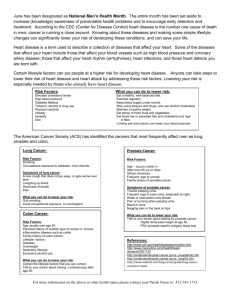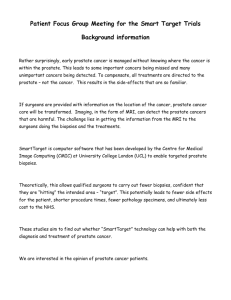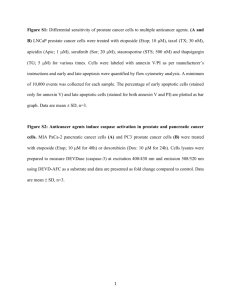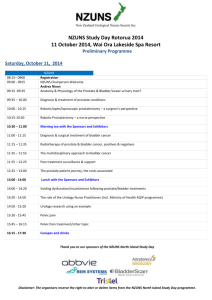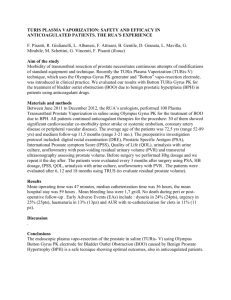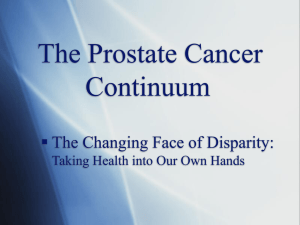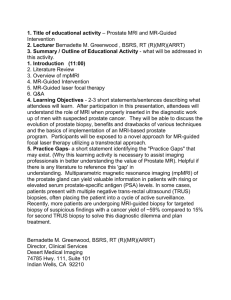What is breast cancer - Society of Oncology and Cancer Research of
advertisement
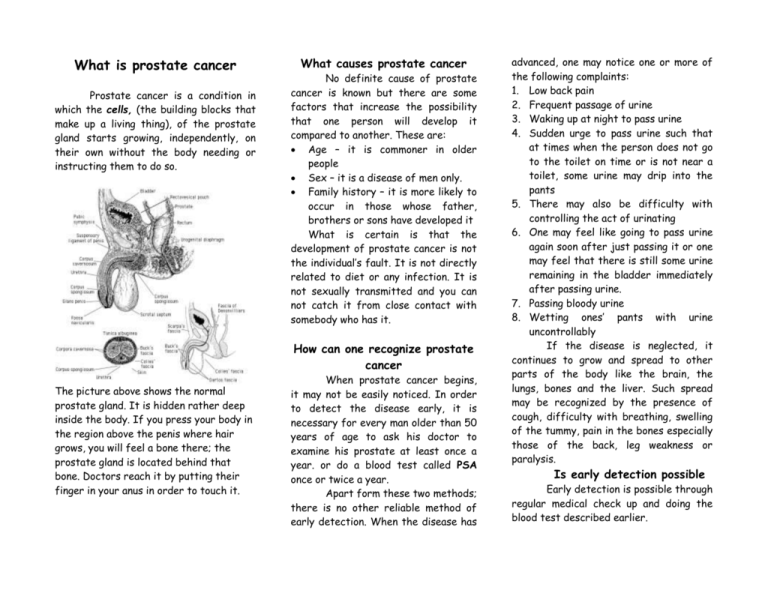
What is prostate cancer Prostate cancer is a condition in which the cells, (the building blocks that make up a living thing), of the prostate gland starts growing, independently, on their own without the body needing or instructing them to do so. What causes prostate cancer No definite cause of prostate cancer is known but there are some factors that increase the possibility that one person will develop it compared to another. These are: Age – it is commoner in older people Sex – it is a disease of men only. Family history – it is more likely to occur in those whose father, brothers or sons have developed it What is certain is that the development of prostate cancer is not the individual’s fault. It is not directly related to diet or any infection. It is not sexually transmitted and you can not catch it from close contact with somebody who has it. How can one recognize prostate cancer The picture above shows the normal prostate gland. It is hidden rather deep inside the body. If you press your body in the region above the penis where hair grows, you will feel a bone there; the prostate gland is located behind that bone. Doctors reach it by putting their finger in your anus in order to touch it. When prostate cancer begins, it may not be easily noticed. In order to detect the disease early, it is necessary for every man older than 50 years of age to ask his doctor to examine his prostate at least once a year. or do a blood test called PSA once or twice a year. Apart form these two methods; there is no other reliable method of early detection. When the disease has advanced, one may notice one or more of the following complaints: 1. Low back pain 2. Frequent passage of urine 3. Waking up at night to pass urine 4. Sudden urge to pass urine such that at times when the person does not go to the toilet on time or is not near a toilet, some urine may drip into the pants 5. There may also be difficulty with controlling the act of urinating 6. One may feel like going to pass urine again soon after just passing it or one may feel that there is still some urine remaining in the bladder immediately after passing urine. 7. Passing bloody urine 8. Wetting ones’ pants with urine uncontrollably If the disease is neglected, it continues to grow and spread to other parts of the body like the brain, the lungs, bones and the liver. Such spread may be recognized by the presence of cough, difficulty with breathing, swelling of the tummy, pain in the bones especially those of the back, leg weakness or paralysis. Is early detection possible Early detection is possible through regular medical check up and doing the blood test described earlier. How is prostate cancer treated Early prostate cancer can be treated by: Surgery – which may involve removal of the entire prostate or a part of it Chemotherapy – use of drugs to destroy cancer cells that may have spread to other parts of the body. These drugs attack all rapidly dividing cells in the body, normal and cancer cells alike. They therefore have sideeffects. There are many different drugs used and one will need to choose. Hormone treatment – altering the rate of growth of the cancer by adjusting the hormonal composition of the body. There are several options here too. Radiotherapy – this is the use of high energy rays to destroy the cancer cells. There are so many options available to the patient with prostate cancer depending on the stage of the disease, the desire of the patient, cost, ability to comply with complex treatment plans and available facilities. The treatment of prostate cancer takes a long period of time and requires many hospital visits. Treatment is also expensive and may require significant amount of time away from work. A patient must discuss these issues with his doctor. It is important for the patient who has prostate cancer to discuss with members of his family so that he can benefit from their support and encouragement. They too will learn useful information about the disease and how to prevent it from the patient. What if the patient’s disease is already advanced? Does that mean nothing can be done? Where there is life, there is hope. No doctor can tell you that this is what will happen in your individual case, so always expect the best. Even when the disease is not responding to treatment, doctors can still do a lot to make sure that patient does not suffer or have pain. What about traditional/alternative /complementary treatment? Everybody who looks after patients with prostate cancer wishes for quick cure so that patients will no longer suffer. Unfortunately, the best science has to offer is still not good enough. However it is far better, safer and surer than any other method of treatment that anybody can offer you today. In addition, you can help the search for better treatment by participating in research and clinical trials. It is therefore advantageous to come to hospital early and start treatment. What is the outcome of treatment The result of treatment refers to average results from treating large numbers of patients. The result in any one individual may therefore differ. The outcome of treatment depends on many factors and these are: Stage at diagnosis. The earlier the stage the better the outcome Nature of the cancer in the individual. This is discerned from laboratory tests that are done on the tumour after its removal from the patient Compliance with an adequate and well formulated treatment plan It is advantageous to go to the hospital early and start treatment. Designed and Produced by Professor Clement A. Adebamowo, Division of Oncology, Department of Surgery, University College Hospital, Ibadan, Oyo State, Nigeria clement_adebamowo@yahoo.com

